外研版九年级上英语module1教学案
2023年外研版九年级英语上册Module1 教学案
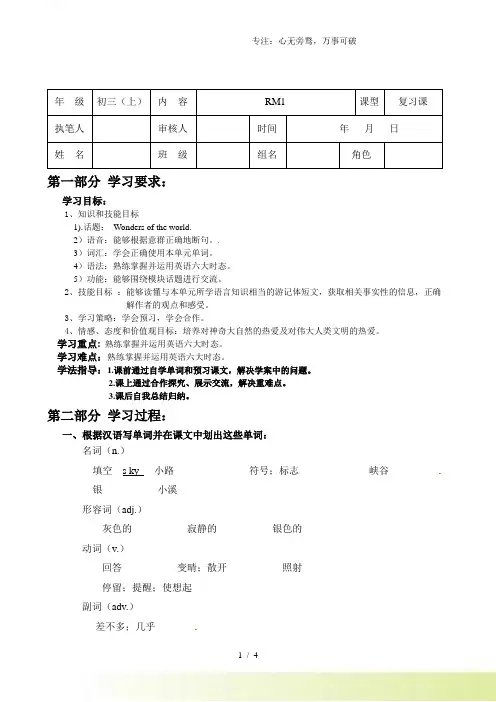
-年级初三(上)内容RM1 课型复习课执笔人审核人时间年月日姓名班级组名角色第一部分学习要求:学习目标:1、知识和技能目标1).话题:Wonders of the world.2)语音:能够根据意群正确地断句。
3)词汇:学会正确使用本单元单词。
4)语法:熟练掌握并运用英语六大时态。
5)功能:能够围绕模块话题进行交流。
2、技能目标:能够读懂与本单元所学语言知识相当的游记体短文,获取相关事实性的信息,正确解作者的观点和感受。
3、学习策略:学会预习,学会合作。
4、情感、态度和价值观目标:培养对神奇大自然的热爱及对伟大人类文明的热爱。
学习重点:熟练掌握并运用英语六大时态。
学习难点:熟练掌握并运用英语六大时态。
学法指导:1.课前通过自学单词和预习课文,解决学案中的问题。
2.课上通过合作探究、展示交流,解决重难点。
3.课后自我总结归纳。
第二部分学习过程:一、根据汉语写单词并在课文中划出这些单词:名词(n.)填空__s ky__ 小路______________ 符号;标志______________峡谷___________银___________小溪___________形容词(adj.)灰色的___________寂静的___________银色的___________动词(v.)回答___________变晴;散开___________照射___________停留;提醒;使想起___________副词(adv.)差不多;几乎___________介词(prep.)在……旁边___________在……下面___________在……边___________ 短语变成灰色________________从……出来________________穿过;从头至尾地练习________________突然向下倾斜________________从(某物上面)看过去;仔细检查________________眺望________________俯视;向下看________________在……顶部________________在……的底部________________ 在两边________________看起来像________________以……闻名________________二、根据课文填空ATony: Let's call Wonders of the World and join in the discussion. I think _______________ wonders are more interesting than man-made ones.And I think the Giant's Causeway is the most fantastic natural wonder. Lingling: Hmm, I've never seen it, so I'm not sure I_______________ you. Why do you like it, Tony?Tony: Well, I _______________ the Giant's Causeway two years ago. It's huge.There're about 40,000 rocks, most of them _______________ six sides.It _______________ several hundred metres _______________NorthernIreland.Lingling: That sounds great, ______ I think Victoria Falls in Africa are even more fantastic. They're about l,700 metres ______ and 100 metres high. Youcan hear the loud noise a few ____________ away.Betty: Wow, that's huge! But __________________, man-made wonders aremore exciting than natural ones. Look at the Terracotta Army. It's morethan 2,000 years old.Daming: I agree with you, Betty. And I think the Three Gorges Dam is fantastic too. It's about 2,300 metres long, 185 metres high and 15 metres wide____________. It __________________ for millions of people in China. Betty: Now, who'd like to call first?BA great wonder of the natural worldWhen I arrived, it was early morning and it was raining. I looked to the east--- the sky was becoming _________. I got out of the car, went _______ a gate and walked _________ a dark path. There was _________ to see, but I knew it was there.After about a mile, a stranger _________ beside the path. "Am I going the right way?" I asked. He knew _________ I was going. "Yes,"he replied,"you'll get there _________ five minutes," Finally, I came to some rocks and stopped. I looked _________ them, but it was _________ and there was _________ of itSudd enly, the rain stopped and the clouds _________. The sun rose _________ me and __________________ the rocks. __________________, the ground __________________ and down to a river. I was looking _________ one of the wonders of the _________ world - the Grand Canyon.I looked down to the Colorado Ri ver, a silver stream nearly one mile _________ me. If you put _________ in the world on top of each other __________________the canyon, they still would not _________ the top. Then Ilooked across to __________________ of the canyon. It was about fifteen miles away, maybe _________. Finally, I looked to my left and to my right, and _________ the canyon went far away for more than 200 miles. The Grand Canyon was not just big. It was _________!I _________ by the canyon for about half an hour, and l asked myself, "Is the Grand Canyon the greatest wonder of the natural world?" I _________ know the answer. What do you think?教师评语:第三部分课后反思1、学后记:(要求:可写收获,也可记课上生成的方法与规律性知识,或问题整理等)2、教后记:第四部分家长签字:。
英语九年级上外研版module1:unit1教案(精品)
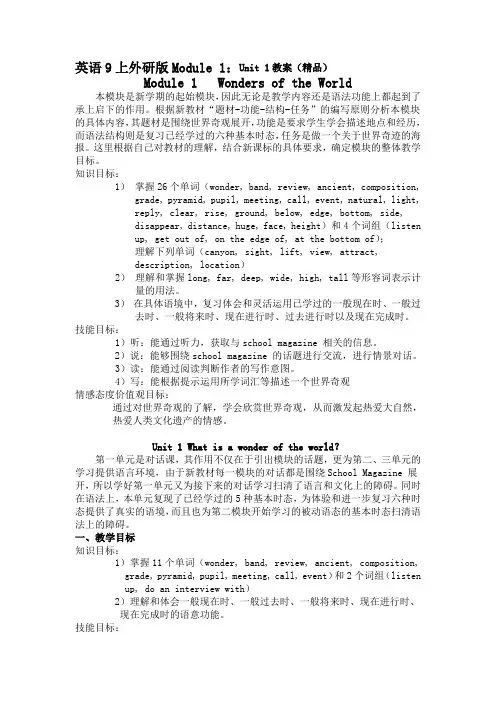
英语9上外研版Module 1:Unit 1教案(精品)Module 1 Wonders of the World 本模块是新学期的起始模块,因此无论是教学内容还是语法功能上都起到了承上启下的作用。
根据新教材“题材-功能-结构-任务”的编写原则分析本模块的具体内容,其题材是围绕世界奇观展开,功能是要求学生学会描述地点和经历,而语法结构则是复习已经学过的六种基本时态,任务是做一个关于世界奇迹的海报。
这里根据自己对教材的理解,结合新课标的具体要求,确定模块的整体教学目标。
知识目标:1)掌握26个单词(wonder, band, review, ancient, composition, grade, pyramid, pupil, meeting, call, event, natural, light,reply, clear, rise, ground, below, edge, bottom, side,disappear, distance, huge, face, height)和4个词组(listenup, get out of, on the edge of, at the bottom of);理解下列单词(canyon, sight, lift, view, attract,description, location)2)理解和掌握long, far, deep, wide, high, tall等形容词表示计量的用法。
3)在具体语境中,复习体会和灵活运用已学过的一般现在时、一般过去时、一般将来时、现在进行时、过去进行时以及现在完成时。
技能目标:1)听:能通过听力,获取与school magazine 相关的信息。
2)说:能够围绕school magazine 的话题进行交流,进行情景对话。
3)读:能通过阅读判断作者的写作意图。
4)写:能根据提示运用所学词汇等描述一个世界奇观情感态度价值观目标:通过对世界奇观的了解,学会欣赏世界奇观,从而激发起热爱大自然,热爱人类文化遗产的情感。
外研版九年级英语上课件 Module 1 教案
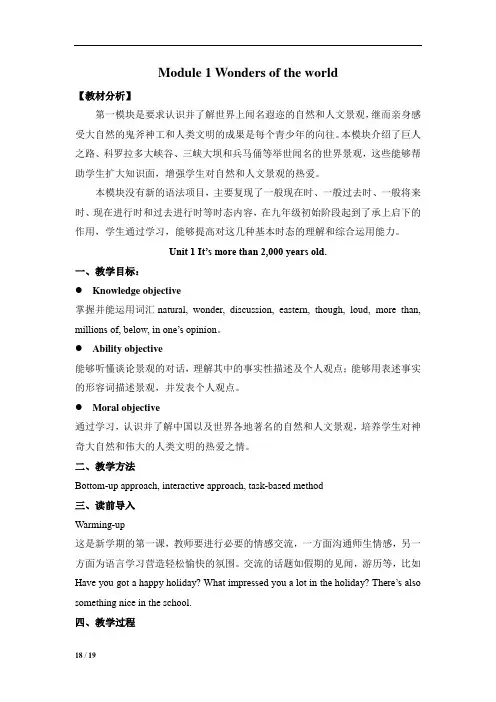
Module 1 Wonders of the world【教材分析】第一模块是要求认识并了解世界上闻名遐迩的自然和人文景观,继而亲身感受大自然的鬼斧神工和人类文明的成果是每个青少年的向往。
本模块介绍了巨人之路、科罗拉多大峡谷、三峡大坝和兵马俑等举世闻名的世界景观,这些能够帮助学生扩大知识面,增强学生对自然和人文景观的热爱。
本模块没有新的语法项目,主要复现了一般现在时、一般过去时、一般将来时、现在进行时和过去进行时等时态内容,在九年级初始阶段起到了承上启下的作用,学生通过学习,能够提高对这几种基本时态的理解和综合运用能力。
Unit 1 It’s more than 2,000 years old.一、教学目标:●Knowledge objective掌握并能运用词汇natural, wonder, discussion, eastern, though, loud, more than, millions of, below, in one’s opinion。
●Ability objective能够听懂谈论景观的对话,理解其中的事实性描述及个人观点;能够用表述事实的形容词描述景观,并发表个人观点。
●Moral objective通过学习,认识并了解中国以及世界各地著名的自然和人文景观,培养学生对神奇大自然和伟大的人类文明的热爱之情。
二、教学方法Bottom-up approach, interactive approach, task-based method三、读前导入Warming-up这是新学期的第一课,教师要进行必要的情感交流,一方面沟通师生情感,另一方面为语言学习营造轻松愉快的氛围。
交流的话题如假期的见闻,游历等,比如Have you got a happy holida y? What impressed you a lot in the holiday? There’s also something nice in the school.四、教学过程Step 1 Lead-in看图片,认识并了解图中的自然/人造奇观:如科罗拉多大峡谷、三峡大坝等,如:What’s the name of the picture? (If you can’t speak English, you can say it in Chinese.)Where is it?What is it famous for?Match the names of the wonders with the pictures on the right and on the next page. (Activity 1)a) The Terracotta Armyb) The Three Gorges Damc) The Giant’s Causewayd) The Victoria FallsStep 2 New words1. 朗读单词: natural, wonder, discussion, eastern, though, loud, more than, millions of, below, in one’s opinion,注意单词中每个音节的发音和字母组合。
Module1 教案1(外研版九年级上)
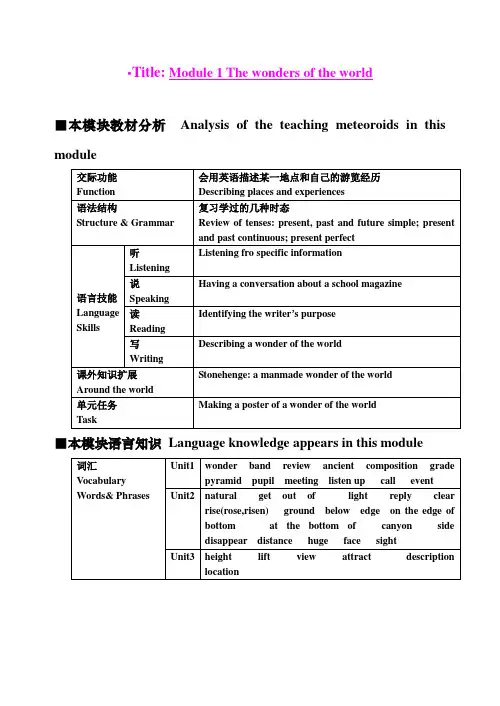
Unit1
Well, she started a school magazine called New standard when she was a pupil here.此句话很长,又是一个含有时间状语从句的复合句,对于学生来讲是阅读中的障碍,可以引导他们如何理解此类句子,帮助他们提高阅读水平。
Unit3
height lift view attract description location
日常交际用语
English Expressions
Unit1
That’s news to me!我一点也不知道。
What’s it about?表示“关于……方面”,等同于on
Listen up, everyone. Listen up=Listen carefully
in front of------in the front of tall-----high
Unit3
The difficult uses of each tense
语法句式
Grammar points & Sentence patterns
Unit1
省略句: Listen up! Brilliant! Anyone else?
The sun rose behind me and beyond the rocks. I saw that the ground fell away and down to a river, far below me.太阳在我身后升起照在岩石上。我看见大地在我眼前突然下沉,峡谷底部的河流在我脚下很远处流淌
•Title:Module 1 The wonders of the world
外研英语九年级上册第一模块教案
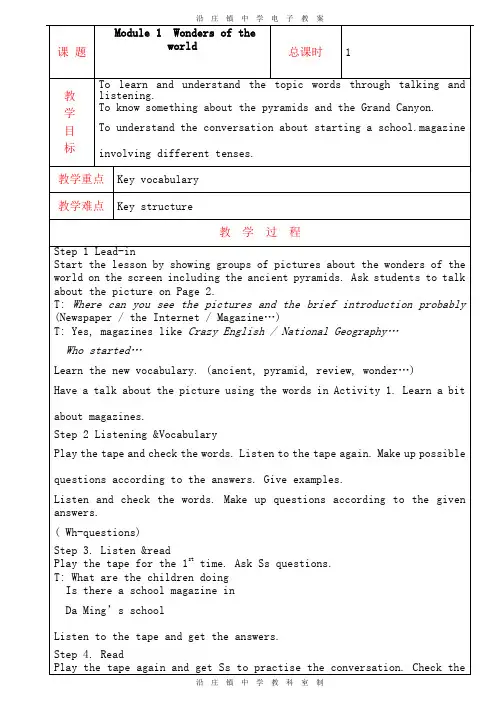
(Listen up, Anyone else do some review, do an interview, on=about, get better grades)
Get Ss to make a list of the articles in magazines.
Demonstrate and get Ss to follow.
Ask andanswer.How tall/deep… is it
It’s…meters tall/deep.
Step 3. Read(Skimming)
Tell Ss to read the passage in Activity 2. Find out the name of the wonder and its facts.
Who started…
Learn the new vocabulary. (ancient, pyramid, review, wonder…)
Have a talk about the picture using the words in Activity 1. Learn a bit about magazines.
T:Where did the writer visit
How deep/wide/long is it
Read thepassage and answer thequestions. Find out the facts and write them down in Activity 5.
Step 4Read and match
Step 2 Listening &Vocabulary
外研版初三上学期,第一模块教案
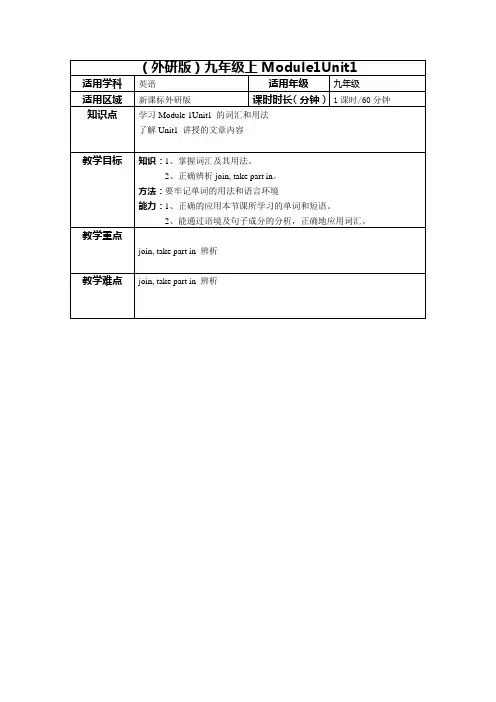
(外研版)九年级上Module1Unit1适用学科英语适用年级九年级适用区域新课标外研版课时时长(分钟)1课时/60分钟知识点学习Module 1Unit1 的词汇和用法了解Unit1 讲授的文章内容教学目标知识:1、掌握词汇及其用法。
2、正确辨析join, take part in。
方法:要牢记单词的用法和语言环境能力:1、正确的应用本节课所学习的单词和短语。
2、能通过语境及句子成分的分析,正确地应用词汇。
教学重点join, take part in 辨析教学难点join, take part in 辨析教学过程一、复习预习复习初二学习的宾语从句复习初二学习的现在完成时二、知识讲解易错点1:Which two natural wonders?wonder在此可以作可数名词,意为“奇观;奇迹”。
Eg:The Great Wall is a great man-made wonder of the world. 长城是世界上一个伟大的人造奇迹。
此外,wonder还可以作动词,意为“想知道;对……感到好奇”。
‘Eg: I wonder what they were doing there. 我想知道他们正在这里做什么。
wonder的形容词为wonderful,意为“极好的,精彩的”。
易错点2:Let’s call Wonders of the World and join in the discussion.join in意为“参加”,指参加某项活动。
多指参加小规模的活动,如“球赛、游戏、讨论”等。
Eg: Would you like to join in the ball game? 你想来参加球赛吗?join 指加入党派、组织或者社会团体,并成为其中一员。
Eg: His elder brother joined the army one year ago.他的哥哥一年前参军了。
take part in指参加群众性活动、会议、劳动等。
外研版英语九年级上册(教学设计)Module 1 Unit 1
Module 1 Wonders of the worldUnit 1 It’s more than 2,000 years old.教材分析This is the first lesson in this module. The listening material is information about wonders. It’s a good text to help the students improve their listening strategies, such as getting information fromthe listening material about wonders.教学目标【知识目标】1. Key words:natural, wonder, discussion, eastern, though, loud, opinion, electricity2. Key phrases:in one’s opinion, more than, millions of, join in, agree with3. Key sentences:(1) I think natural wonders are more interesting than man-made ones.(2) Hmm, I’ve never seen it, so I’m not sure I agree with you.(3) It’s about 1,700 metres wide and 100 metres high.(4) But in my opinion, man-made wonders are more exciting than natural ones.【能力目标】To get information of wonders in the world.【情感目标】Learn to respect nature.Learn to introduce wonders in the right way.教学重难点【教学重点】Learn the key words.Key vocabulary:army,man-made ,natural,wonder,discussion,opinion,in one’s opinion,eastern,though,loud,electricityKey structures:join in,That sounds great.,in my opinion, looked over, looked down to, Far below me, the ground fell away and down to a river.【教学难点】Learn to listen for main points about wonders.Learn to introduce wonders.课前准备Multimedia教学过程Step I. Warm-up1. Know about wonders of the world.T shows some pictures to introduce wonders of the world: the Three Gorges Dam, the Terracotta Army, the Giant’s Causeway and Victoria Falls.2. Match the pictures with wonders.3. Ss use some adjectives to describe the wonders: ancient, modern, man-made and natural.【设计意图】用图片直观,形象地引入本课话题,激发学生兴趣,活泼课堂气氛,为正式进入课文内容的学习进展热身。
外研版九年级英语上册教案 Module1 Unit1
教学重点
Key vocabulary:nature, wonder, discussion, eastern, though, loud, in one’s opinion, more than, millions of
3. Put students in small groups and encourage them to think of famous places and describe which wonders they would like to visit and give a reason.
Step 5
Summarize
1. Guide the students to make a list of wonders of the world.
2. Guide the students to summarize what they have learnt in this unit.
Step 6
Consolidation
2. Play the recorder again and have the students answer the questions in Activity 4.
3. Guide the students to complete the sentences in Activity 5.
4. Play the recorder for the third time and ask the students to pay attention to the pronunciation.
外研版英语九上Module 1《Wonders of the world》(Unit 1)教学设计
外研版英语九上Module 1《Wonders of the world》(Unit 1)教学设计一. 教材分析《Wonders of the world》是外研版英语九上Module 1的教学内容,本节课主要介绍了世界上的一些奇迹,包括中国的长城和埃及的金字塔。
通过本节课的学习,学生可以了解不同国家的文化,拓宽视野,提高对英语学习的兴趣。
教材内容丰富,插图精美,有利于激发学生的学习兴趣。
二. 学情分析九年级的学生已经具备了一定的英语基础,能够进行简单的听、说、读、写操作。
但是,对于一些高级词汇和句型的理解仍然存在困难。
因此,在教学过程中,需要关注学生的个体差异,尽量让每个学生都能参与到课堂活动中来。
三. 教学目标1.知识目标:学生能够掌握与奇迹相关的词汇和句型,如“One of theseven wonders of the world”、“built over thousands of years”等。
2.能力目标:学生能够在适当的情境下运用所学知识进行交流,提高听说读写能力。
3.情感目标:通过学习,学生能够尊重和欣赏不同国家的文化,培养跨文化交际的意识。
四. 教学重难点1.重点:奇迹相关词汇的掌握和运用,以及句型的运用。
2.难点:对于一些高级词汇和句型的理解,如“be famous for”、“attractmillions of visitors each year”等。
五. 教学方法1.任务型教学法:通过完成各种任务,让学生在实际操作中运用所学知识。
2.情境教学法:创设各种情境,让学生在真实的语境中学习英语。
3.交际法:鼓励学生进行小组合作,进行互动交流,提高口语表达能力。
六. 教学准备1.教学课件:制作课件,包括文本、图片、视频等,以便于生动展示教学内容。
2.教学素材:收集与奇迹相关的中英文资料,用于拓展学生的知识面。
3.录音机、投影仪等教学设备:用于播放音频和视频材料。
七. 教学过程1.导入(5分钟)利用图片和视频展示长城和金字塔,引导学生谈论对奇迹的认识,激发学生的学习兴趣。
Module1Unit1外研版英语九年级上册教案详解
(2)句型:掌握重点句型-How do you feel about...? -I feel excited/nervous about...;-What's your goal for...? -My goal for...is to...,有助于学生进行有效沟通,表达自己的情感和期望。
(五)总结回顾(用时5分钟)
今天的学习,我们了解了如何用英语表达开学时的情感和目标,学习了相关的词汇和语法点。通过实践活动和小组讨论,我们加深了对这些知识点的理解。我希望大家能够掌握这些知识点,并在实际生活中灵活运用。如果有任何疑问或不明白的地方,请随时向我提问。
五、教学反思
在Module 1 Unit 1《Starting School》的教学过程中,我注意到了一些值得反思的地方。首先,学生在表达开学时的情感和目标时,对于词汇的运用还不够熟练。在今后的教学中,我需要更加注重词汇教学的落实,通过设计更多的情境练习,帮助学生熟练掌握词汇用法。
(4)阅读理解:通过阅读文章,了解不同国家的开学习俗,提高学生的阅读理解和跨文化交际能力。
举例:学生能理解并总结出文章中提到的不同国家的开学活动。
2.教学难点
(1)词汇运用:学生在实际对话中可能难以准确运用新学词汇表达情感,需要教师引导学生通过模仿、替换等练习,熟练掌握词汇用法。
举例:教师可设计角色扮演活动,让学生模拟真实场景,运用词汇表达自己的情感。
Module 1 Unit 1外研版英语九年级上册教案详解
一、教学内容
Module 1 Unit 1《Starting School》外研版英语九年级上册,本节课将围绕以下内容展开:
- 1、下载文档前请自行甄别文档内容的完整性,平台不提供额外的编辑、内容补充、找答案等附加服务。
- 2、"仅部分预览"的文档,不可在线预览部分如存在完整性等问题,可反馈申请退款(可完整预览的文档不适用该条件!)。
- 3、如文档侵犯您的权益,请联系客服反馈,我们会尽快为您处理(人工客服工作时间:9:00-18:30)。
冠县东古城镇中学2015—2016学年上学期九年级英语教学案时态的判定一、时间状语同时态的关系:一般情况下,简单句可根据句中的时间状语确定谓语动词的时态。
其判定方式如下:1、句中含有yesterday; last year(last + 具体时间); two days ago(一段时间+ ago); just now; this morning; in 2008(in + 过去的年代); the other day; over the weekend等时间状语时,谓语动词用一般过去时;2、句中含有tomorrow; next week(next +具体时间); in two hours(in +一段时间); (how) soon; from now on; 10 years from now(一段时间+from now); in the future; in 2012(in +将来的年代); by (the end of) next month(by+将来时间); for the weekend; this afternoon; this evening; tonight; this weekend等时间状语时,谓语动词用一般将来时;3、句中既有yesterday等过去时间状语,又有一个具体时间点(at 5:00; this time; at that time)时,谓语动词用过去进行时;4、句中含有recently; in the last/past two years(in the last/past+一段时间); over the years(over the+一段时间); since 2005(since+具体时间或从句); for two years(for+一段时间,句中无其它时间状语); before(单独用于句尾)等时间状语时,谓语动词用现在完成时;5、by (the end of) last year(by+过去时间); two days before(一段时间+before); for 和since说明的时间同时用于句中;by the time + 从句(过去时态)等时间状语时,谓语动词用过去完成时;6、简单句中如不含上述时间状语或有含说话时间在内的表示现在时间关系的词语时(如now; today; these days等词),其时态的判定一般按以下步骤进行:------ 句中是否含有表示频率关系的词。
如有,用一般现在时;------ 句子是否说明客观规律。
如是,用一般现在时;------ 句中动词是否表示状况。
如是,用一般现在时;------ 句中动词是否为延续性动态动词。
如是,用现在进行时;------ 句中动词是否为完成性动词(瞬间动词)。
如是,用现在完成时。
二、主从句时态的一致性原则:主从复合句可根据其时态一致性原则,通过主从句中任意一个句子的时态确定另外一个句子的时态;含有时间状语从句的主从句还可通过其引导词所表示的不同时间关系,确定主句和从句的时态。
三、通过上下文关系判定时态:另外我们还可以根据并列谓语的时态一致性原则、问句和答语的时态一致关系、无转折时间的短文时态一致原则等上下文时态的关联以及句子的逻辑关系来判定句子中谓语动词的时态。
Exercise( )1. What _____ you _____ over the weekend?A. will; doB. does; doC. did; doD. were,; doing( )2. Xiao Li usually _____ to school by bike last year.A. goesB. wentC. will goD. is going( )3. What _____ in our town 100 years from now?A. happenedB. is happenedC. has happenedD. will happen( )4. Mr. Smith _____ to see you in an hour.A. cameB. has comeC. will comeD. comes( )5. _____ you _____ from your parents recently?A. Did; hearB. Have; heardC. Do; hearD. Will; hear( )6. We _____ TV at home this time last night.A. were watchingB. watchedC. have watchedD. would watch( )7. We _____ over 1500 English words by the end of last month.A. have learnedB. had learnedC. will learnD. learnt( )8. She _____ in Shanghai for ten years since 1992.A. has livedB. had livedC. livedD. will live( )9. She _____ in Shanghai for ten years.A. has livedB. had livedC. livedD. will live( )10. We all know that the earth _____ round the sun.A. goesB. wentC. is goingD. will go( )11. “Where are the boys?”“They _____ soccer on the playground.”A. playB. are playingC. were playingD. played( )12. Look! Lucy _____ under the tree.A. readsB. is readingC. was readingD. read( )13. He _____ more than 200 model cars in the last five years.A. has collectedB. had collectedC. collectedD. will collect( )14. Jim _____ a letter to his parents at 7:30 last night.A. had writtenB. wroteC. would writeD. was writing( )15. The Smiths _____ in Beijing since two weeks ago.A. stayedB. were stayingC. would stayD. have stayed( )16. “When _____ you _____ the bike?”“Last Monday.”A. have; boughtB. did; buyC. will; buyD. do; buy( )17. Look! The boy _____English now.A. likesB. likedC. is likingD. was liking( )18. Most students in our class _____ TV twice a week.A. watchB. watchedC. will watchD. are watching( )19. How soon _____ they _____ back from work?A. do; comeB. did; comeC. have; comeD. will; come( )20. “Where _____ you _____ Mr. Li?”“In his office, half an hour ago.”A. will; seeB. did; seeC. have, seenD. do; see( )21. I _____ a new dictionary. Look! It’s very useful.A. boughtB. will buyC. have boughtD. would buy( )22. I won’t watch the movie tonight. I _____ it before.A. will seeB. have seenC. sawD. had seen( )23. Hello! I _____ know you _____ in Chengdu. How long have you been here?A. didn’t; wereB. don’t areC. didn’t; areD. don’t; were( )24. He _____ a fire and then cooked a meal.A. had madeB. was makingC. madeD. has made( )25. If I _____ time tomorrow, I will go to visit my grandfather.A. haveB. will haveC. would haveD. am having( )26. I’m going to be a doctor when I _____ up.A. growB. will growC. grewD. am growing( )27. The film _____ on for five minutes when I got to the cinema.A. has beenB. had beenC. wasD. is( )28. She _____ dinner when her son came in.A. has cookedB. had cookedC. was cookingD. would cook( )29. The train _____ when we got to the station. We had to wait for the next one.A. has leftB. had leftC. leftD. was leaving( )30. He said that he _____ to the barber’s tomorrow morning.A. will goB. wentC. is goingD. would go( )31. In the last years I _____ a lot of friends.A. have madeB. madeC. will makeD. was making ( )32. The boys _____ for about two hours.A. are playing soccerB. have been playing soccerC. were playingD. play soccer( )33. He _____ so quickly that he could win the race.A. is runningB. will runC. ranD. had run( )34. He didn’t go there with us because he _____ there before.A. has beenB. had beenC. wentD. would go( )35. I don’t know if he ______ tomorrow. If he _____, I will tell you.A. will come; will comeB. comes; comesC. will come; comesD. comes; will come( )36. When I was young, my mother told me that the sun _____ in the east. A. rise B. rises C. rose D. had risen( )37. “_____ you _____ your work?” “Yes. I finished it an hour ago.”A. Did; finishB. Have; finishedC. Will; finishD. Had; finished ( )38. Hurry up, or you _____ the early bus.A. will missB. has missedC. would missD. missed( )39. I _____ Mr. Green while I _____ along the street last Sunday.A. met; walkedB. was meeting; walkedC. met; was walkingD. was meeting; was walking( )40. Tom is strong and he _____ to school every day.A. walkedB. walksC. will walkD. has walked( )41. He said that he _____ with Mr. Black at that time.A. talkedB. was talkingC. is talkingD. would talk( )42. We _____ English in this school since we came here.A. have studiedB. studiedC. had studiedD. were studying( )43. She _____ at home until her mother came back.A. has stayedB. stayedC. had stayedD. will stay( )44. There will be an interesting movie _____ two days.A. forB. inC. afterD. since( )45. She _____ there until I came back.A. didn’t leaveB. has stayedC. leftD. was staying( )46. It has been raining _____ two hours ago.A. untilB. forC. sinceD. by( )47. His father _____ since he was two years old.A. has diedB. diedC. has deathD. has been dead ( )48. The meeting _____ for ten minutes when I got there yesterday. A. has begun B. had begun C. has been on D. had been on ( )49. He had collected over 500 stamps _____ he was twelve years old.A. sinceB. forC. untilD. by the time ( )50. I was doing my homework _____ she rang me up last night.A. whenB. whileC. sinceD. before( )51. “Where is John?” “He _____ the library.”A. has been toB. has gone toC. has been inD. has been at( )52. How long _____ you _____ the computer?A. have; boughtB. did; buyC. have ; hadD. will; buy ( )53. She _____ Shanghai for two days.A. leftB. has leftC. will leaveD. has been away from ( )54. He didn’t tell me anything about it _____ he left.A. sinceB. untilC. by the timeD. while( )55. She _____ China since she was five years old.A. has come toB. has arrived atC. has arrived inD. has been in( )56. I had finished my homework _____ I watched TV last night.A. beforeB. afterC. whenD. until( )57. Miss White has been _____ the music club for 4 years.A. joiningB. joinC. joinedD. in( )58. What do you think he will _____ ten years?A. be forB. be atC. be toD. be in( )59. There _____ two football games in our school next week.A. is going to beB. will haveC. will beD. is going to have ( )60. They _____ a birthday party next Friday afternoon.A. is going to beB. will beC. will haveD. is going to have ( )61. How long have you ____ the pen?A. keptB. boughtC. borrowedD. got( )62. I _____ Mr. Brown since I left Shanghai in 2004.A. have seenB. sawC. haven’t seenD. didn’t see( )63. You don’t have to describe her. I _____ her several times.A. had metB. have metC. metD. meet( )64. I _____ a cold for five days. I still can’t get rid of it.A. caughtB. hadC. have caughtD. have had( )65. What _____ you _____ at nine o’clock that morning?A. are; doingB. did; doC. were; doingD. had; done( )66. What _____ y ou _____ by nine o’clock that morning?A. are; doingB. did; doC. were; doingD. had; done( )67. The sign _____, “ No Parking!”A. readsB. was readC. is readingD. read( )68. “_____ you _____ your lunch?” “Yes. I _____ it at school.”A. Did; have; have hadB. Have; had; hadC. Did; have; hadD. Have; had; have( )69. Lily _____ for her mother until she _____ home.A. will wait; will comeB. won’t wait; comesC. will wait; comesD. waits; will come( )70. “Mr. Brown is leaving for a trip.” “Really? Where _____ he _____?”A. has; goneB. will; goC. did; goD. does; go( )71. Tom, you _____ the book for two weeks. You have to return it now.A. borrowedB. have borrowedC. keptD. have kept( )72. “Have you mended your shoes?” “Yes. I _____ it twenty minutes ago.”A. have mendedB. mendedC. had mendedD. will mend( )73. Mr. Smith _____ to China last year and _____ in love with her.A. goes; fallsB. went; fellC. went; feltD. has gone; fell。
